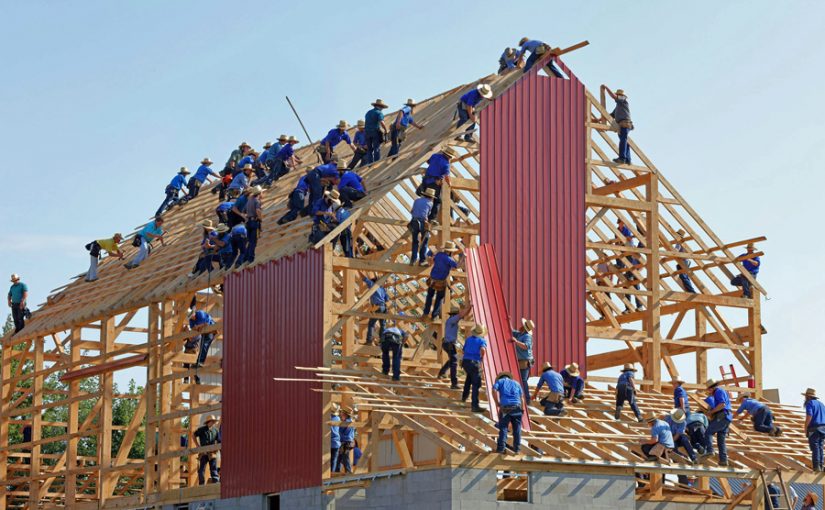A homily for the Fifth Sunday of Easter, April 28, 2024
Acts 9:26-31, 1 Jn 3:18-24, Jn 15:1-8
My brother Steve has lived in the Lancaster, Pennsylvania, area for at least two decades, and while his neighborhood can be described as all-American middle class, he and his family do encounter Amish people fairly often.
The Amish, also known as the Anabaptists or, more widely, the Pennsylvania Dutch, live in a closed society, pretty much. These descendants of German Protestant immigrants avoid most modern technologies. They travel in horse-drawn buggies and till their fields with horse-drawn plows. Actual horsepower, lubricated with elbow grease.
And because these Christians are so close-knit, their belief in all for one and one for all leaves The Three Musketeers in the dust.
No, not the candy bar.
Now, one of the things the Amish are most famous for is barn-raising. Whenever a new structure is needed, dozens and dozens of burly men gather at dawn to yank on massive saws and swing heavy hammers … and up rise the walls and over flies the roof, and in what seems like only a few hours, the sturdiest barn you’ve ever seen is ready for cows and horses.
That’s powerful.
Amazing.
Certainly a lot different from the Jersey ‘burbs.
We “English,” as the Amish refer to outsiders, tend to look at them and their way of living as a curiosity, as an oddity, the way ugly Americans may misbehave while traveling overseas.
A Lancaster County tourist attraction. Check out all the brochures and maps.
But Anabaptist religious beliefs aside, their work ethic, especially the ethic exemplified by their barn-raisings, ties together today’s messages from the First Letter of Saint John and from John’s Gospel.
Their work ethic provides an example for us English.
The Amish work together as a community, a community of faith, of faith in God and faith in each other as fellow children of God.
They work together as branches of the True Vine, Jesus. Their lives are interconnected, the way a vineyard is.
They work together as a sign of faith and charity in action, not merely words. And, mostly, they tend to keep their words to a minimum.
And their work delivers tangible results. Barns. Houses. Furniture. Meats and vegetables. Shoo-fly pie.
Sore muscles and callused hands.
As Jesus says:
Whoever remains in me and I in him will bear much fruit,
because without me you can do nothing.
Their work bears much fruit.
Does ours?
There are two ways our work in Christ’s name can bear tangible results.
The first, like Eagle Scout candidate Declan’s project in the Peace Garden this weekend, joins our hands and rakes and shovels to leave God’s Creation a little closer to its original perfection. Or fills the produce bins and flower vases at Lunch Break the way our Community Garden does. Or fills the big wooden box in the hallway with grocery items and cleaning supplies and diapers and holiday toys and so much more to aid people with so much less.
It’s the love of God, flowing through Jesus the True Vine, through us the branches, bearing physical — and actual, delicious — fruit.
Tangible results. Measurable results.
The second way goes a little deeper. It’s a little more emotional and spiritual, while a little less subject to weights and measures. It can be scary. It can leave calluses on parts of us where we wouldn’t expect them.
The second way we can enable the love of God that flows through Jesus the True Vine to flow through us the branches is to open our hearts and ignore the clock.
Somewhere somebody is in pain, the kind of pain a patient listener can ease. Somewhere somebody could use a companion or guide. Somewhere somebody wants or needs to be re-grafted onto the True Vine, or to be grafted to Jesus for the first time in their lives.
We probably do not have to look far to find them.
And for anyone in need, anyone in pain, anyone who’s lost, we can be those shoulders to cry on, those ears to hear, those eyes to see The Way. Our lives, the way we live our lives, can act as the vine-tender that connects somebody with the Source of All That Is Good.
We can add branches to the True Vine.
Our deeds can testify to God’s Truth.
And our shining a light in somebody’s life truly yields tangible results. Tears stop falling. Hands stop quivering. Smiles slowly emerge.
Yes, the First Letter of St. John makes it clear:
[L]et us love not in word or speech
but in deed and truth.
Indeed, that’s the truth.
